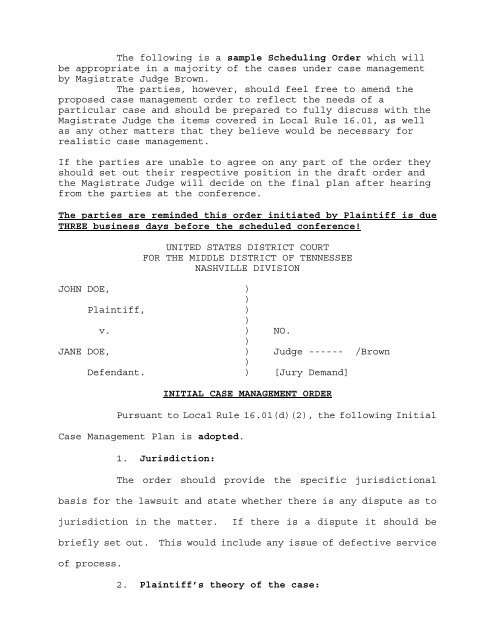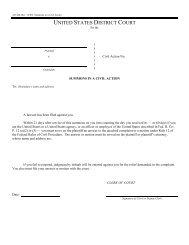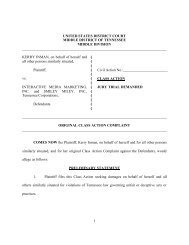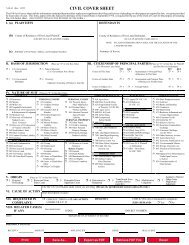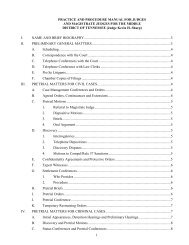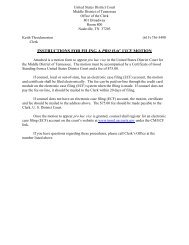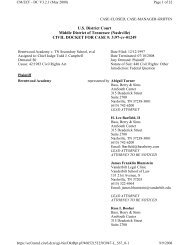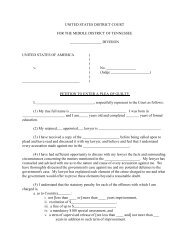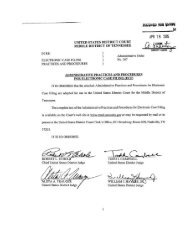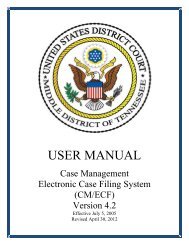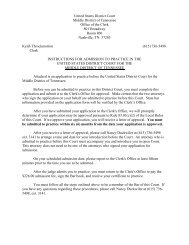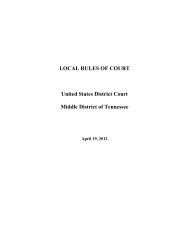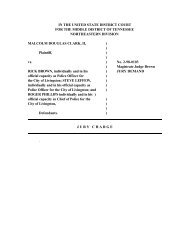Initial Case Management Order - US District Court Middle District of ...
Initial Case Management Order - US District Court Middle District of ...
Initial Case Management Order - US District Court Middle District of ...
You also want an ePaper? Increase the reach of your titles
YUMPU automatically turns print PDFs into web optimized ePapers that Google loves.
The following is a sample Scheduling <strong>Order</strong> which will<br />
be appropriate in a majority <strong>of</strong> the cases under case management<br />
by Magistrate Judge Brown.<br />
The parties, however, should feel free to amend the<br />
proposed case management order to reflect the needs <strong>of</strong> a<br />
particular case and should be prepared to fully discuss with the<br />
Magistrate Judge the items covered in Local Rule 16.01, as well<br />
as any other matters that they believe would be necessary for<br />
realistic case management.<br />
If the parties are unable to agree on any part <strong>of</strong> the order they<br />
should set out their respective position in the draft order and<br />
the Magistrate Judge will decide on the final plan after hearing<br />
from the parties at the conference.<br />
The parties are reminded this order initiated by Plaintiff is due<br />
THREE business days before the scheduled conference!<br />
UNITED STATES DISTRICT COURT<br />
FOR THE MIDDLE DISTRICT OF TENNESSEE<br />
NASHVILLE DIVISION<br />
JOHN DOE, )<br />
)<br />
Plaintiff, )<br />
)<br />
v. ) NO.<br />
)<br />
JANE DOE, ) Judge ------ /Brown<br />
)<br />
Defendant. ) [Jury Demand]<br />
INITIAL CASE MANAGEMENT ORDER<br />
Pursuant to Local Rule 16.01(d)(2), the following <strong>Initial</strong><br />
<strong>Case</strong> <strong>Management</strong> Plan is adopted.<br />
1. Jurisdiction:<br />
The order should provide the specific jurisdictional<br />
basis for the lawsuit and state whether there is any dispute as to<br />
jurisdiction in the matter. If there is a dispute it should be<br />
briefly set out. This would include any issue <strong>of</strong> defective service<br />
<strong>of</strong> process.<br />
2. Plaintiff’s theory <strong>of</strong> the case:
This should be a short version <strong>of</strong> the plaintiff’s theory<br />
and should not exceed one (1) page, except in unusual<br />
circumstances. It should not be simply a repeat <strong>of</strong> the complaint.<br />
3. Defendant’s theory <strong>of</strong> the case:<br />
The defendant’s theory should also be a short summary <strong>of</strong><br />
the Defendant’s theory not to exceed one (1) page.<br />
4. Identification <strong>of</strong> the issues:<br />
Set out the issues that have been resolved, if any, and<br />
the issue that remains unresolved.<br />
5. Need for other claims or special issues under Rules<br />
13-15, 17-21, and Rule 23 <strong>of</strong> the Federal Rules <strong>of</strong> Civil Procedure:<br />
If the parties anticipate counter-claims, cross-claims,<br />
third-party claims, and joinder <strong>of</strong> other parties or claims, or<br />
class action certification, or the need for resolution <strong>of</strong> any<br />
issues arising under the above-cited rules, they should be stated<br />
here.<br />
6. Witnesses, if know, subject to supplementation by<br />
each party.<br />
7. <strong>Initial</strong> Disclosures and Staging <strong>of</strong> Discovery:<br />
A date for initial disclosures should be set if<br />
disclosures have not already been made. If the parties wish to<br />
waive Rule 26(a), they should so state. In many cases an overall<br />
deadline for all discovery can be stated.<br />
If the needs <strong>of</strong> a<br />
particular case dictate, discovery may be staged or may provide<br />
2
particular dates for disclosure <strong>of</strong> experts and Rule 26(a)(2)<br />
statements. If, because <strong>of</strong> anticipated jurisdictional motions or<br />
motions to dismiss, stays or limitations on discovery are needed,<br />
they should be set out under this paragraph.<br />
Conclude with the statement that prior to filing any<br />
discovery-related motion the parties will schedule and conduct a<br />
telephone conference with the Magistrate Judge. [The counsel<br />
requesting the conference shall check with opposing counsel as to<br />
their availability before setting a time certain with the <strong>Court</strong>.]<br />
8. Dispositive motions:<br />
A deadline for the filing <strong>of</strong> dispositive motions should<br />
be listed as well as specific dates for the response and reply.<br />
Normally the response should be 28 days after the date the motion<br />
is filed, and the reply should be 14 days after the date the<br />
response is filed. The order should provide that if dispositive<br />
motions are filed early, the response and reply dates are moved up<br />
accordingly. The order should provide that the motion and response<br />
memoranda are limited to 25 pages and the reply, if a reply is<br />
filed, is limited to five pages, absent <strong>Court</strong> permission for longer<br />
pleading.<br />
9. Other deadlines:<br />
If there are other deadlines that need to be established<br />
due to the nature <strong>of</strong> the case they should be set out in this<br />
3
section. This should include any motion to amend pleadings or add<br />
parties.<br />
10. Subsequent case management conferences:<br />
Normally there should be a provision for a subsequent<br />
case management conference. This date will be selected based upon<br />
the needs <strong>of</strong> the case. In most situations it will normally be<br />
scheduled approximately 60 days before the close <strong>of</strong> discovery. The<br />
parties should also provide whether the subsequent case management<br />
conference will be conducted by telephone, and if so, who will<br />
initiate the call, or whether it will be conducted in <strong>Court</strong>.<br />
[Magistrate Judge Brown has a call in number that may be used for<br />
conference calls 615 695 2851.]<br />
11. Alternate dispute resolution:<br />
In this section the parties should set out any plans for<br />
alternate dispute resolution and whether they believe alternate<br />
dispute resolution is appropriate. The parties may wish to set a<br />
target date for a report on the use <strong>of</strong> ADR.<br />
14. Consent to trial before the Magistrate Judge:<br />
Parties should state it they all consent to trial before<br />
the Magistrate Judge. Unless all parties consent the statement<br />
should be that the parties do not consent. The position <strong>of</strong> a single<br />
party should not be disclosed.<br />
13. Target trial date:<br />
In this section the parties should state whether the case<br />
will be a jury or a bench trial and the estimated length <strong>of</strong> the<br />
4
trial.<br />
The parties should further request a target trial date.<br />
Normally this date should be approximately 3 to 4 months after the<br />
date set for the filing <strong>of</strong> a reply brief for dispositive motions,<br />
or if no dispositive motions are anticipated, approximately 2 to 3<br />
months after the close <strong>of</strong> discovery. The trial date will not be set<br />
less that ninety (90) days after the close <strong>of</strong> dispositive motions.<br />
[Normally date for the Trial and Final Pretrial Conference will be<br />
secured from the <strong>District</strong> Judge during the conference, however<br />
Judge Campbell will set his trial date by later order based on the<br />
target date in the order.<br />
It is so ORDERED:<br />
APPROVED FOR ENTRY:<br />
_______________________________<br />
Attorney for the plaintiff<br />
______________________________<br />
JOE B. BROWN<br />
United States Magistrate Judge<br />
_______________________________<br />
Attorney for the defendant<br />
5


